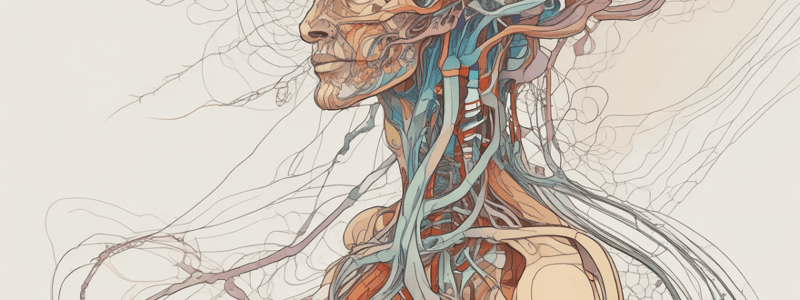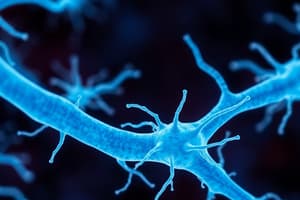Podcast
Questions and Answers
What is the primary function of the motor system in the nervous system?
What is the primary function of the motor system in the nervous system?
- Regulating automatic functions like circulation and digestion
- Detecting sensory information
- Controlling skeletal muscle movement and tone (correct)
- Facilitating cognitive functions like thinking and learning
Which of the following senses is NOT included in somatosensation?
Which of the following senses is NOT included in somatosensation?
- Hearing
- Vibration
- Vision
- Taste (correct)
What is the primary function of the automatic nervous system?
What is the primary function of the automatic nervous system?
- Facilitating sensory perception and integration
- Controlling voluntary muscle movements
- Regulating conscious thought and emotions
- Maintaining homeostasis through reflexes and autonomic functions (correct)
Which of the following is a function of the higher nervous system?
Which of the following is a function of the higher nervous system?
What is the primary function of the emotions in the nervous system?
What is the primary function of the emotions in the nervous system?
What is the primary function of consciousness in the nervous system?
What is the primary function of consciousness in the nervous system?
Which of the following functions is NOT a basic function of the nervous system?
Which of the following functions is NOT a basic function of the nervous system?
What is the primary role of emotions in the nervous system?
What is the primary role of emotions in the nervous system?
Which of the following is an example of an automatic function of the nervous system?
Which of the following is an example of an automatic function of the nervous system?
What is the primary function of cognition in the nervous system?
What is the primary function of cognition in the nervous system?
Which of the following senses is NOT directly related to cognition?
Which of the following senses is NOT directly related to cognition?
What is the primary function of consciousness in the nervous system?
What is the primary function of consciousness in the nervous system?
Which of the following is a function of the nervous system that does not require conscious involvement?
Which of the following is a function of the nervous system that does not require conscious involvement?
What is the result of the motor functions controlling skeletal muscle?
What is the result of the motor functions controlling skeletal muscle?
Which of the following senses is included in the sensory functions of the nervous system?
Which of the following senses is included in the sensory functions of the nervous system?
What is the primary role of cognition in the higher functions of the nervous system?
What is the primary role of cognition in the higher functions of the nervous system?
What is the awareness of being a person, experiencing life, and controlling actions?
What is the awareness of being a person, experiencing life, and controlling actions?
Which of the following is an example of an emotion?
Which of the following is an example of an emotion?
Flashcards are hidden until you start studying
Study Notes
Nervous System Functions
- The nervous system performs various functions that enable a person to experience life and create behavior, as well as necessary bodily functions that are often unconscious.
Basic Functions
- The basic functions of the nervous system can be divided into three categories: motor, sensory, and automatic functions.
- Motor functions control skeletal muscle, resulting in movement, tone, and posture.
- Sensory functions involve detection of various senses, including vision, hearing, smell, taste, vestibular sense, and somatosensation (touch, body position, vibration, pain, temperature, etc.).
- Automatic functions do not require conscious involvement, including reflexes, control of circulation, respiration, and digestion.
Higher Functions
- The higher functions of the nervous system are performed by parts of the brain and can be divided into three categories: cognition, emotions, and consciousness.
- Cognition includes thinking, learning, memory, language, and executive functions (creating goals and organizing behavior).
- Emotions are feelings that play a major role in the experience of life and other functions of the nervous system and body.
- Consciousness is the awareness of being a person, experiencing life, and controlling actions, but its exact definition is still unclear.
Nervous System Functions
- The nervous system enables a person to experience life, create behavior, and perform necessary bodily functions, often unconsciously.
Basic Functions
- The nervous system has three main categories of functions: motor, sensory, and automatic functions.
- Motor functions control skeletal muscle, resulting in movement, tone, and posture.
- Sensory functions involve detection of various senses, including: • Vision • Hearing • Smell • Taste • Vestibular sense • Somatosensation (touch, body position, vibration, pain, temperature, etc.)
- Automatic functions do not require conscious involvement, including: • Reflexes • Control of circulation • Respiration • Digestion
Higher Functions
- The higher functions of the nervous system are performed by parts of the brain and can be divided into three categories: cognition, emotions, and consciousness.
- Cognition includes: • Thinking • Learning • Memory • Language • Executive functions (creating goals and organizing behavior)
- Emotions are feelings that play a major role in the experience of life and other functions of the nervous system and body.
- Consciousness is the awareness of being a person, experiencing life, and controlling actions.
Nervous System Functions
- The nervous system enables a person to experience life, create behavior, and perform necessary bodily functions, often unconsciously.
Basic Functions
- The nervous system has three main categories of functions: motor, sensory, and automatic functions.
- Motor functions control skeletal muscle, resulting in movement, tone, and posture.
- Sensory functions involve detection of various senses, including: • Vision • Hearing • Smell • Taste • Vestibular sense • Somatosensation (touch, body position, vibration, pain, temperature, etc.)
- Automatic functions do not require conscious involvement, including: • Reflexes • Control of circulation • Respiration • Digestion
Higher Functions
- The higher functions of the nervous system are performed by parts of the brain and can be divided into three categories: cognition, emotions, and consciousness.
- Cognition includes: • Thinking • Learning • Memory • Language • Executive functions (creating goals and organizing behavior)
- Emotions are feelings that play a major role in the experience of life and other functions of the nervous system and body.
- Consciousness is the awareness of being a person, experiencing life, and controlling actions.
Nervous System Functions
- The nervous system enables a person to experience life, create behavior, and perform necessary bodily functions, often unconsciously.
Basic Functions
- The nervous system has three main categories of functions: motor, sensory, and automatic functions.
- Motor functions control skeletal muscle, resulting in movement, tone, and posture.
- Sensory functions involve detection of various senses, including: • Vision • Hearing • Smell • Taste • Vestibular sense • Somatosensation (touch, body position, vibration, pain, temperature, etc.)
- Automatic functions do not require conscious involvement, including: • Reflexes • Control of circulation • Respiration • Digestion
Higher Functions
- The higher functions of the nervous system are performed by parts of the brain and can be divided into three categories: cognition, emotions, and consciousness.
- Cognition includes: • Thinking • Learning • Memory • Language • Executive functions (creating goals and organizing behavior)
- Emotions are feelings that play a major role in the experience of life and other functions of the nervous system and body.
- Consciousness is the awareness of being a person, experiencing life, and controlling actions.
Studying That Suits You
Use AI to generate personalized quizzes and flashcards to suit your learning preferences.




